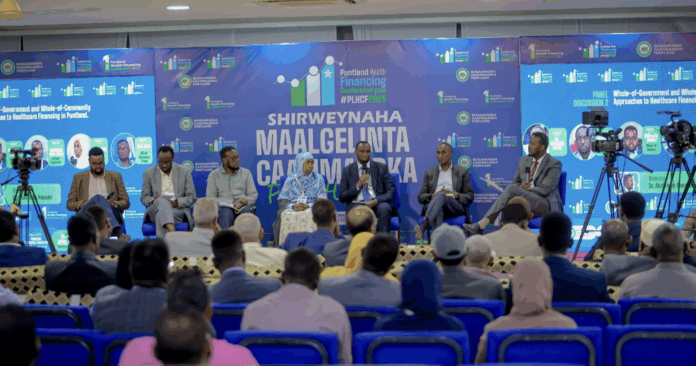GAROWE (Kaab TV) — In the wake of recent U.S. aid cuts under former President Donald Trump’s second administration, Puntland officials and civil society groups have begun discussions on how to bridge the funding gap and invest in local solutions, particularly in the health sector.
The Puntland Ministry of Health hosted the region’s largest-ever conference on health investment in Garowe, the state capital, bringing together government leaders, entrepreneurs, and civil society representatives on 21-22 April.
The two-day gathering also included participation from the deputy president, ministers, parliamentarians, medical professionals, and experts from both local and international communities.
“This is an important meeting. Our discussions focused on how Puntland can become more self-sufficient,” said Daud Mohamed Omar, Puntland’s Minister of Planning.
Minister of Health Said Jama Qorshel echoed the call for local businesspeople and investors to contribute financially to the health sector, aiming to make healthcare more affordable and accessible.
During the conference, officials proposed several strategies to boost domestic revenue for health services.
Plans include imposing a special fee on products and services that pose health risks—such as khat, tobacco, and cosmetics—and launching a phased community health insurance system, starting with government employees like military, police, and civil servants.
Puntland also plans to establish a healthcare cost-sharing system to support the sustainability of essential health services.
Additionally, the conference encouraged direct investments from private businesses in the health sector through Public-Private Partnership (PPP) initiatives and Corporate Social Responsibility (CSR) programs.
The shock of the aid cut was significant
The gathering followed a similar consultation meeting hosted by the Puntland Parliament a week earlier, where civil society groups discussed ways forward amid the shrinking U.S. support.
Dr. Fadumo Hosh, a university lecturer, emphasized the urgency of developing local solutions, saying: “The shock of the aid cut was significant. What matters now is whether a real plan will be developed and implemented.”
Mohamed Hassan from the Puntland Civil Society Network acknowledged the severe impact of the funding cuts but remained hopeful.
“There is a possibility to find local solutions. This conference represents a promising step toward cost-sharing between the government and civil society,” he said.
Member of Parliament Yasin Jama also stressed the importance of continued collaboration: “We are seeing more willingness from civil society, but the government must also step up its efforts.”
In fiscal year 2023, the United States Agency for International Development (USAID) allocated approximately $1.05 billion in foreign assistance to Somalia, supporting initiatives such as humanitarian relief, health services, education, governance, and infrastructure development.
However, by fiscal year 2024, USAID’s humanitarian assistance to Somalia had dropped to approximately $116 million, as conflict, food insecurity, and displacement continue to challenge the country’s stability.


